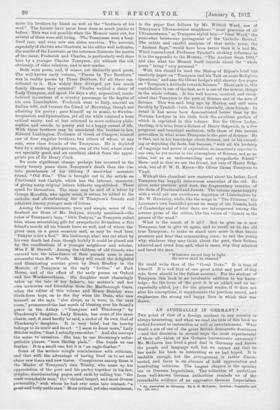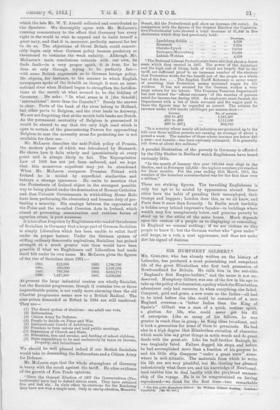AN AUSTRALIAN IN GERMANY.*
THE point of view of a foreign resident in any country is always interesting, and when we read the title of this book we looked forward to instruction as well as entertainment. What would a son of one of the great British democratic dominions —and that dominion in several ways the most experimental of them all—think of the German bureaucratic autocracy ? Mr. McLaren has lived a good deal in Germany and knows the people and language well, but we cannot say that he has made his book as interesting as we had hoped. It is readable enough, but the arrangement is rather discon- nected, and there is an absence of bold appreciation and penetrating criticism. The longest chapter is the opening one on German Imperialism. The collection of quotations from well-known German authorities reminds us of the remarkable evidence of an aggressive German Imperialism • An Australian in Germany. By A. D. McLaren. London : Constable and Co. [8s. net.] 'which the late Mr. W. T. Arnold collected and contributed to the Spectator. We thoroughly agree with Mr. McLaren's e'unning commentary to the effect that Germany has every tight in the world to wish to expand and to build herself a great navy, and that it is, moreover, perfectly natural for her to do so. The objections of Great Britain could conceiv- ably begin only when German policy became predatory or tkreatened to victimize the weak unfairly. Although Mr. MeLaren's main conclusions coincide with our own, he finds fault—in a very proper spirit, it is true, for he .does so only through trying to be perfectly fair— 'with some British arguments as to German foreign policy. He objects, for instance, to the manner in which English 'newspapers spoke of the Scheldt as though it were an inter- national river when Holland began to strengthen the fortifica- tions at the mouth at what seemed to be the bidding of Germany. He asks : " In what sense is it [the Scheldt'j international' more than the Danube ? " Surely the answer is clear. Parts of the bank of the river belong to Holland, but other parts to Belgium, and the river leads to Antwerp. We are not forgetting that at the mouth both banks are Dutch. As the permanent neutrality of Belgium is guaranteed it would be absurd to say that the only high road which is open to certain of the guaranteeing Powers for approaching Belgium in case the necessity arose for protecting her is not available for their use.
Mr. McLaren describes the anti-Polish policy of Prussia, the modern phase of which was introduced by Bismarck. He shows how it fails utterly and ignominiously at every point and is always likely to fail. The Expropriation Law of 1908 has not yet been enforced, and we hope that this monstrous expedient may yet be abandoned When Mr. McLaren compares Prussian Poland with Ireland he is misled by superficial similarities and betrays a strange ignorance. He omits to mention that the Protestants of Ireland object in the strongest possible way to being placed under the domination of Roman Catholics and that Unionist Governments in withholding Home Rule Lave been performing the elementary and humane duty of pro- tecting a minority. His analogy between the oppression of the Poles and the so-called Coercion Acts in Ireland, which aimed at preventing assassination and ruthless forme of agrarian crime, is pure nonsense.
It is too often forgotten by Englishmen who read of the advance of Socialism in Germany that a large part of German Socialism is simply Liberalism which has been unable to enlist itself under its proper banner. Under the German system of stifling ordinary democratic aspirations, Socialism has gained strength at a much greater rate than would have been possible if what we Englishmen call Liberalism had made itself felt under its own name. Mr. McLaren gives the figures of the rise of Socialism since 1881 :— 1881. 812,000 1893. 1,786,700 1884. 550,000 1898. 2,107,076 1887. 763,100 1903. 3,010,771 1890. 1,427,300 1907. 3,259,000
At present the large industrial centres are wholly Socialist, but the Socialist programme, though it contains two or three impracticable points, is not really more alarming than the old Chartist programme seems now to a British Radical. The nine points demanded at Erfurt in 1894 are still unaltered. They are—
(1) The direct system of elections : ono adult one vote. (2) Referendum.
(3) Citizen Army for Defence.
(4) People to decide on Peace and War. (5) International Courts of Arbitration.
(6) Freedom to form unions and hold public meetings. <7) Separation of Church and State.
{8) Education, free and secular, and feeding of school children. (9) State expenditure to be met exclusively by taxes on Income, Property, and Inheritance.
We should be well pleased indeed if our British Socialists would take to demanding the Referendum and a Citizen Army for Defence.
Mr. McLaren says that the whole atmosphere of Germany is heavy with the revolt against the tariff. He cites evidence of the growth of Free Trade opinions.
"Since the General Election of 1907 the Conservatives (Pro- tectionists) have had to defend eleven seats. They have retained five and lost six. In sixty other by-elections for the Reichstag they have not won a single seat. Only in one by-election, Meseritz- Bornst, did the Protectionist poll show an increase (88 votes). In comparison with the figures of the Geneial Election the Conserva- tive-Protectionist vote showed a total decrease of 81,449 in five
electorates which they had previously held
Decrease.
Landsberg-Soldin ... 4,358 Eisenach ... 2,624 Oletzko-Lynek ... 10,018 Zschopen-Merionberg 10,091 Labiau-Wehlau 4,358 ...
"The National Liberal Protectionists have also lost about a dozen seats which they carried in 1907. The power of the Agrarians and the high coat of living, both of which are largely due to the tariff, are sufficient proof to an immense number of the electors that Protection works for the benefit not of the people as a whole but of the few. . . . The English Tariff Reformer is never weary of asserting that Protection means increased wages for the workers. It has not secured for the German worker a very large return for his labour. The Prussian Taxation Department has just issued the ' official summary' of the number of persons rated for income-tax during 1910. As employers must furnish the Department with a list of their servants and the wages paid to them the figures may be regarded as correct. The returns for incomes under 1,350 marks (shillings) per annum show :— Income. 445 to 451 451 to 460 460 to 4674
No. of persons.
1,341,497 1,111,000 804,703
"In a country whore nearly all industries are protected up to the hilt over three million persons are earning an average of about a pound a week. The number of those whose incomes are below 445 a year—not taxable—has been variously estimated. It is generally put down at about five millions."
A. parallel illustration of the poverty in Germany is afforded by the City Shelter in Berlin of which Englishmen have heard
curiously little.
"In the month of January this year 133,644 mon slept in the Shelter, and in February 125,633—the highest numbers yet reached for those months. For the year ending 31st March, 1911, the number of the homeless accommodated was for the first time over a million."
These are striking figures. The travelling Englishman is only too apt to be misled by appearances abroad. Some cities have the habit of parading their unemployed, their tramps and beggars ; London does this, as we all know, and
Paris does it more than formerly. In Berlin much hardship is hidden away behind impressive façades—in buildings where wealth may live sumptuously below, and genuine poverty be skied up in the attics of the same house. Much depends upon the custom of a people as to displaying or concealing. In England we conceal nothing ; if we are victims we like people to know it ; but the German worker who " goes under " still keeps, as a rule, a neat appearance, and does not make dirt his signal of distress.



















































 Previous page
Previous page